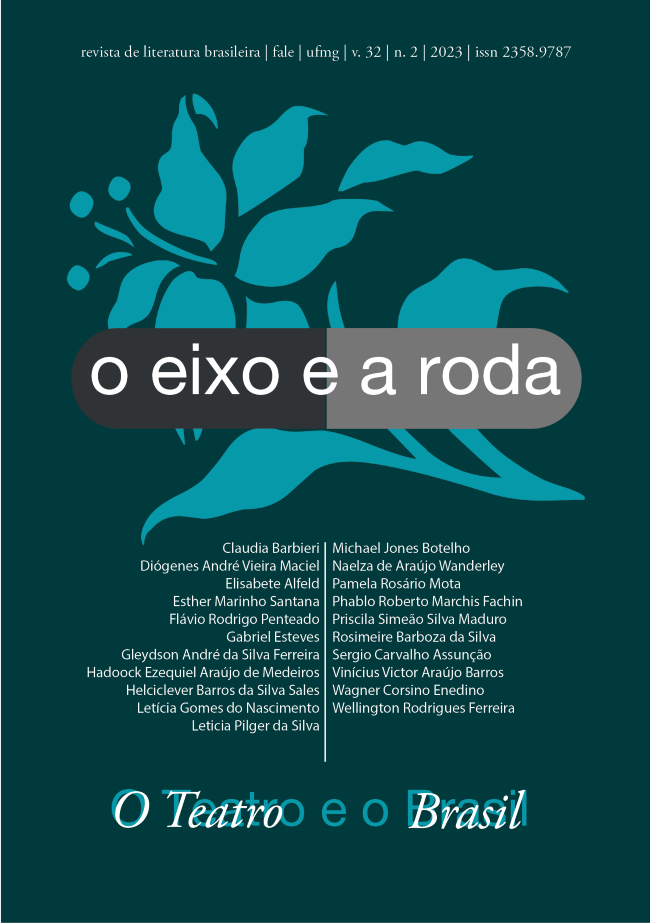Quando as máquinas param
o teatro de Plínio Marcos no telecinema português
DOI:
https://doi.org/10.17851/2358-9787.32.2.160-185Palavras-chave:
Quando as máquinas param, Plínio Marcos, Cinema PortuguêsResumo
O objetivo desse ensaio é discutir e analisar o filme português Quando as máquinas param (1984-1985) dos cineastas Pedro Belo e Luís Filipe Costa baseado na peça homônima de Plínio Marcos (1963-1967). Essa obra fílmica foi produzida para o canal de TV RTP 1 e exibido em 1985. O elenco contou com Júlio César (Zé), Adelaide Ferreira (Nina), Luísa Salgueiro (D. Marlana), Pedro Efe (Milongas), José Wallenstein (Angarlador), Canto e Castro (pai de Tonico), Amadeu Coronho (Manel), Argumento e diálogos por Pedro Belo e Luís Filipe Costa. Ao que tudo indica, é a única transposição cinematográfica desta peça de Plínio Marcos, assim como o primeiro e único filme estrangeiro baseado no teatro pliniano, hipótese que será objeto de maiores reflexões. Importante frisar que a RTP 1 era o único canal de TV à época da redemocratização portuguesa. Isso é particularmente curioso visto que esse canal vinha se reconfigurando ao nascente cenário democrático após a longa ditadura lusa (o canal iniciou suas transmissões em 1956-1957, ainda sob o jugo ditatorial), de forma que produzir um filme a partir de peça pliniana, justo no ano de 1985, ano do início da abertura política brasileira, não deixa de ser algo digno de menção e análise. A escolha dos realizadores portugueses acerca da peça Quando as Máquinas Param e sua temática central, o desemprego, para transposição em filme, em associação ao momento vivido, tanto por Portugal, quanto o Brasil, naquele instante histórico.
Referências
AUMONT, J; MARIE, M. Dicionário teórico e crítico de cinema. Tradução de Eloisa Araújo Ribeiro. 4. ed. Campinas: Papirus, 2009.
BALOGH, A. M. Conjunções, Disjunções, transmutações: da literatura ao cinema e à TV. 2ª Ed. São Paulo: Annablume, 2005.
BARROS, J. d’A. Cinema e história–as funções do cinema como agente, fonte e representação da história, Ler História, 52, p. 127-159, 2007. DOI: https://doi.org/10.4000/lerhistoria.2547.
CORSEUIL, A. R. Estudos de adaptação entre a literatura e o cinema: narrativas que viajam no tempo e no espaço. In: BONNICI, T.; ZOLIN, L. O. (Orgs). Teoria Literária: abordagens históricas e tendências contemporâneas. 4. ed. ampl. e rev. Maringá: Eduem, 2019, p. 369-378.
DIÁRIO DE LISBOA, nº 21911, Ano 65, Sexta-feira, 15 de novembro de 1985, p. 20, Fundação Mário Soares/ DRR - Documentos Ruella Ramos, Disponível em: http://hdl.handle.net/11002/fms_dc_3244. Acesso em: 16 jun. 2022.
DIÁRIO DE LISBOA, nº 21911, Ano 65, Sexta-feira, 15 de novembro de 1985, p. 23. Fundação Mário Soares/ DRR - Documentos Ruella Ramos, Disponível em: http://hdl.handle.net/11002/fms_dc_3244. Acesso em: 16 jun. 2022.
ENEDINO, W. C. et al. A presença da ausência: a subalternidade na dramaturgia (bem) dita de Plínio Marcos. Prefácio de João Adalberto
Campato Jr. 1. ed. Campinas: Pontes Editores, 2021.ENEDINO, W, C. Entre o limbo e o gueto: literatura e marginalidade em Plínio Marcos. Campo Grande/MS: Ed. UFMS, 2009.
FIELD, S. Manual do roteiro: os fundamentos do texto cinematográfico. Tradução Alvaro Ramos. Rio de Janeiro: Objetiva, 2001.
HUTCHEON, L. Uma teoria da adaptação. Tradução de André Cechinel. Florianópolis: Ed. da UFSC, 2011.
MENDES, O. Bendito Maldito: uma biografia de Plínio Marcos. São Paulo: Leya, 2009.
NEVES, J. L. C. O crescimento económico português no pós-guerra: um quadro global Análise Social, vol. XXIXK (128), p. 1005-1034, 1994 (4.°). Disponível em: http://analisesocial.ics.ul.pt/documentos/1223378178X8sYF6cn2Bl69AP4.pdf. Acesso em: 13 jun. 2022.
OLIVEIRA, A. M. de; SILVA, A. R. da. A significação do silêncio em Quando as máquinas param, de Plínio Marcos, Revista Athena, [S. l.], v. 17, n. 2, 2019. Disponível em: https://periodicos.unemat.br/index.php/athena/article/view/4404. Acesso em: 14 maio. 2022.
QUANDO AS MÁQUINAS PARAM. (Parte I e II). Direção: Luís Filipe Costa. Argumento e diálogos: Pedro Belo e Luís Filipe Costa. Série “Em Lisboa uma Vez”. Portugal: RTP 1, 15 novembro 1985. 53 min. 45s. Colorido. Versão digital de filme feito para TV. Disponível em: https://arquivos.rtp.pt/conteudos/quando-as-maquinas-param-parte-i/ e https://arquivos.rtp.pt/conteudos/quando-as-maquinas-param-parte-ii/. Acessos em: 03 maio 2022.
PLÍNIO MARCOS. Quando as máquinas param. In: Plínio Marcos: obras teatrais: noites sujas. (Org.). Alcir Pécora. Rio de Janeiro: FUNARTE, 2016, p. 125-184. Disponível em: https://www.funarte.gov.br/wp-content/uploads/2020/01/Plinio-Marcos-V-2-Noites-sujas-WEB.pdf. Acesso em: 14 maio 2022.
PORTUGAL. MINISTÉRIO DAS FINANÇAS, SECRETARIA DE ESTADO DO TESOURO. Aspectos da evolução e da gestão da dívida pública em Portugal. Lisboa, 1991, p. 9. Disponível em: https://purl.sgmf.gov.pt/COL-MF-0025/1/COL-MF-0025_item1/COL-MF-0025_PDF/Aspectos1_revisto.pdf. Acesso em: 23 fev. 2023.
RATTNER, H. Inquérito sobre o Desemprego em São Paulo. Rev. adm. empres. 4 (12), Set 1964. Disponível em: https://doi.org/10.1590/S0034-75901964000300006. Acesso em: 10 maio 2022.
SOUSA, I. A. Televisão e ficção televisiva em Portugal (1974-1992). Do advento da democracia à liberalização da atividade televisiva. Tese (Doutorado). Porto: Universidade Lusófona do Porto, 2019. Disponível em: http://hdl.handle.net/10437/10022. Acesso em: 13 jun. 2022.
SPIVAK, G. C. Pode o subalterno falar? Trad. Sandra Regina Goulart Almeida et al. Belo Horizonte: Ed. UFMG, 2010.
XAVIER, Ismail. Do texto ao filme: a trama, a cena e a construção do olhar no cinema. In: PELLEGRINI, Tânia et al. Literatura, cinema e televisão. São Paulo: Editora Senac São Paulo: Instituto Itaú Cultural, 2003, p. 61-89.










